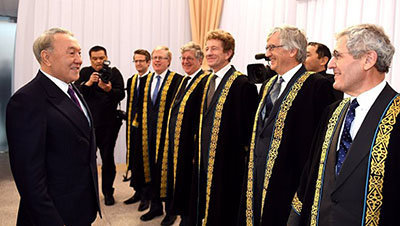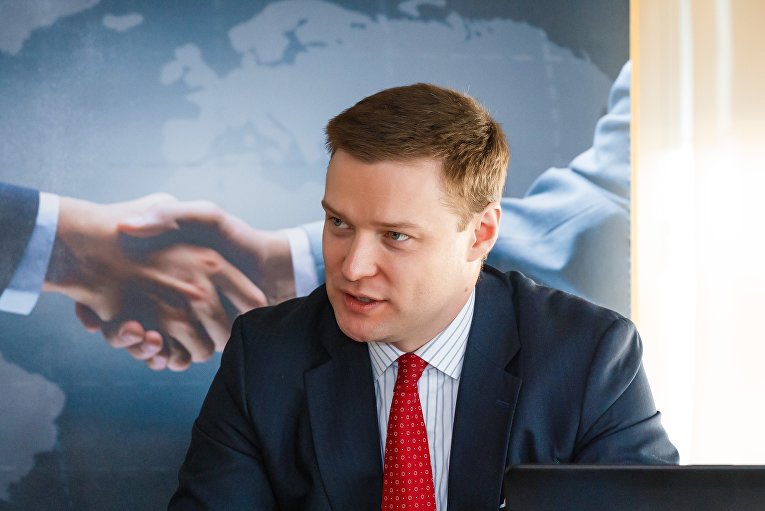A unique financial hub was officially launched in Kazakhstan, in July 2018. The Astana International Financial Centre (AIFC) boasts to have its own International Arbitration Centre (IAC) and the English common law Court. Mr. Christopher Campbell-Holt, Registrar and Chief Executive of both institutions, provides insight on how they operate and manage to deal with the local authorities.
- Mr. Campbell-Holt, the establishment of the International Arbitration Centre of the AIFC looks quite natural. However, what was the point in arranging the English common law court in Kazakhstan?
- A common misunderstanding with setting up new dispute resolution institutions within the financial centres or special economic zones is that you should have either an arbitration centre or a court.
Different models have been used in different jurisdictions. But by far the most sensible in my view and my experience is to offer both - a court and an arbitration centre. And the reason for doing that is because we have got to think of the market, the business people, the lawyers representing businesses.
Sometimes parties prefer a court, and sometimes they want an arbitration. We believe that increasingly parties will want arbitration. But my experience shows that is not always the case. I would say it is about 50/50 or 60/40 depending on the market you are in. Parties often prefer arbitration if they want more privacy and control over the proceedings.
Another common misunderstanding is that it is cheaper to resolve dispute through arbitration. It is absolutely not. It is often about privacy and control over the proceedings. An arbitration can be more expensive than a court sometimes depending on the facts of a particular case. The interplay between the court and the arbitration is absolutely critical for any financial centre to succeed, to attract business and to show businesses that they have a trustworthy and credible system that will protect investors’ rights.
In addition to arbitration in our IAC, we provide a commercial court, which is modelled on English Common law courts. It aims to give more trust and confidence to investors so they are more likely to invest because they see that our AIFC Court can be used successfully.
Eventually, there is close cooperation between our court and arbitration centre. There are very limited supervision, supervisory powers of our court with regards to an arbitration at IAC.
- The decision to arrange the AIFC Court has nothing to do with possible troubles with the enforcement of arbitral awards by state courts and doubts about their capabilities?
- No. The idea is to provide a system that is absolutely trustworthy and that is distinguished by international investors who might not be quite familiar with the infrastructure of Kazakhstan. We are here to provide an alternative option for investor protection in the Republic.
We are independent and have a close cooperation with our partners within the local court system, and we work together on certain issues as much as we possibly can, without interrupting our independence.
If you want to invest into Kazakhstan with local courts protecting your rights as an investor then do so, we would encourage that. The AIFC is just an alternative option, especially if you are familiar with the common law system. Ultimately with such a hub for international investment in Kazakhstan the whole of Central Asia region can win.
- I should admit that I was surprised to know that all applications, administration and hearings at the IAC are free of charge. On the one hand, it is extremely appealing. On the other, there is no such thing as a free lunch, and there should be someone to pay…
- We are the exception. We want to be cost effective for people who opt to resolve disputes either through our court or through our arbitration centre. You are going to pay only for the time of your lawyers and the bills of the law firm as it is in the usual way, while the administration of the proceedings, all of the arbitration, is free of charge.
And the reason we have done this because we are new, and we want to attract investments to Kazakhstan. We have made a commitment not to charge any fees at least until after December 31st, 2021. Moreover, as we have clearly indicated, the current offering – the free fees proposal – remains valid for the lifetime of contracts that include the AIFC Court and International Arbitration Centre and that are signed any time between now and December 31st, 2021.
So that is our commitment because we want business to believe that we have a credible offering for international standards dispute resolution. We know that it is of interest because we talk to people, and we believe strongly that will provide enormous value for the whole region of Central Asia.
- As we know, time is money when it comes to business. What is the proposed duration of arbitration in IAC and hearings in the AIFC Court?

Our case management process at the court and the arbitration centre applies the latest innovative procedures. I have a role to play here, as Registrar, as well as the judges managing the cases and our excellent and internationally trained support team.
The idea is often to set the date of the trial at the earliest possible opportunity. This is classic case management to make it as effective and quick as possible, and then to work back from that provisional trial date to ensure everything is managed carefully. What I mean by that is documentation to ensure that everything is done in the correct and proper way, so that when the judge considers those papers we hope the case will progress as smoothly as it possibly can.
In practice it is rarely that simple. When you have a hearing all sorts of issues come up. But we have a system in place to make sure that case management is as quick and cost effective as it possibly can be. It is certainly quicker at the AIFC than it might be in other leading financial centres around the world because of who we are and how we work with our system.
The other point in terms of speed is our e-justice system. This is an electronic system which we have developed with a leading IT provider from Singapore. We have the latest cutting-edge digital technology in our court and our arbitration centre. All paperwork can now be done electronically and filed electronically from anywhere around the world and for free.
So it gives the international, regional and local communities instant access to the AIFC Court and International Arbitration Centre. We know that our system is the latest on the world market. We know that because, we have tested our system with various markets and lawyers.
We have a trustworthy, credible IT platform with video and telephone conference at the touch of a button, and our system is secure.
- Can any company go to the AIFC Court or apply to the IAC provided that it has a contract with an included arbitration clause or the company has to be registered in the AIFC first?
- While we encourage businesses to register in the AIFC, any party that wants to bring a dispute to the AIFC Court or the International Arbitration Centre does not have to be a registered member of the AIFC. We have an opt-in jurisdiction which means that businesses, individuals from anywhere around the world can bring a dispute for the resolution at our court or our arbitration centre if they agree to it at any stage of the business relationship even if they have no association whatsoever to Kazakhstan or the region.
- The Commercial Court in London as well as LCIA have long been popular among litigants from Kazakhstan and Russia. Do you expect them to switch to the AIFC Court and IAC after a while?
- I am not saying that what we are doing in Kazakhstan will adversely affect the numbers, the statistics of arbitrations or commercial cases in London. That is not our objective. Our objective is to provide a credible dispute resolution facility to bring more investments into Kazakhstan.
Our court and the arbitration centre have been included in more than one thousand business contracts in just 10 months this year. As I understand most of those contracts include parties doing business in Kazakhstan. This does not mean that there is less business going to London or Singapore or anywhere else, but it does mean that new business is coming to us. That is an enormously positive sign. Obviously, we do not encourage disputes to happen under the contracts, but we are already willing and able to serve the parties to those contracts if they happen to have a dispute and wish to use our services.
I am confident that there will be work for the AIFC Court and IAC in foreseeable future. We cannot predict what would happen but taking into account the one thousand contracts I have no doubts that there will be a work for the AIFC Court and the International Arbitration Centre in the future. Who knows whether it has an impact on the work of the arbitration institutions in London or Singapore? We will have to wait and see. But as I said that is not our objective.
- How does the AIFC Court given the fact that it is an English common law court get along with state courts in Kazakhstan? Will its practice be incorporated by state courts? Shouldn’t they feel uncomfortable?

We have applied, with Lord Woolf, Chief Justice of the AIFC Court, all of our years of experience to ensure that while we are completely independent from the local Kazakh court system, we have a very close cooperation in a friendly way which has no impact on our independence.
When our judges were appointed to the AIFC Court through the Kazakhstan system, we invited our judges to come six, seven or eight times throughout the year to speak at key conferences, to meet with Zhakip Asanov, Chairman of Kazakhstan's Supreme Court. I happen to be a member of the international advisory body of the Supreme Court of Kazakhstan modernizing court systems applying international best practices. Lord Woolf invited Chairman Asanov to London for the state opening of the English and Welsh legal year.
We cooperate successfully to build trust and confidence between our Chief Justice, our Judges and the Supreme Court of Kazakhstan, Chairman Asanov. Judges of the AIFC Court frequently give lectures on the English common law at the Kazakhstan Supreme Court.
I believe we have built trust and confidence. We on both sides appreciate support of our efforts led by the Chief Justice of the AIFC Court and the Chairman of the Supreme Court of Kazakhstan because we are working for the benefit of the Republic and the Central Asia region. We are not competing in any way. It is in my view a mistake in some jurisdictions where local courts compete instead of aiming to complement each other.
We said based on our experience that we needed a court and an arbitration centre at the AIFC that should cooperate with each other and our partners but also remain independent. That is what we have done, and we are all contributing towards the overall project of bringing international investment into Kazakhstan, the Central Asia region. We have to work together doing day-to-day business on a co-operative and friendly basis and respect our principle of independence.
- Do you interact with the Court of the Eurasian Economic Union? What role does the court play in the way the AIFC Court and IAC work?
- The Eurasian Economic Court has not played any substantive role so far in the dealings of the AIFC Court and the International Arbitration Centre. That is because we have only been in operation since January, 1st, 2018, and, as I have already said, we are absolutely independent. We are not beholden to any court either in Kazakhstan or outside Kazakhstan. However, we proactively encourage cooperation with courts around the world whether they are in London, New York, Singapore, and likeminded arbitration centres. We are looking for opportunities to cooperate, but in a way that will not in any way affect the independence of our court and our arbitration centre.
- The AIFC Court and IAC have been built from scratch, and the starting positions of both institutions are really impressive. However, time is needed for the large businesses to get interested. In your opinion, how much time is needed?
- Firstly, thank you for your support and appreciation of what has been done at the AIFC. Three years ago when the project was launched there was a blank piece of paper, me, Lord Woolf and AIFC authority. And we created absolutely everything from scratch, even the design of the judges’ gowns and logos. We drafted the laws, regulations, rules, and had the judges to be properly appointed. We are very proud of our achievements, of the work that has not been achieved anywhere in such a short period of time. It took us 10 months to become operational.
Secondly, of course, it takes time for a court and arbitration centre like ours to attract cases work. But we have been astonished by the progress and the appetite in the market throughout Kazakhstan and the whole Central Asia region. We had our first case in the AIFC Court earlier this year within just 14 months commencement of our operations and this was successfully enforced in Kazakhstan quickly.
We have already had two mediations at our IAC. We know that we are being tested while working. It will take time not just for our court and the arbitration centre to develop a regular case load, and also, for the AIFC prosper. Now, however, we at the AIFC Court and IAC are ready and able to deliver justice quickly and cost effectively.
Interviewed by Vladimir Yaduta, RAPSI



